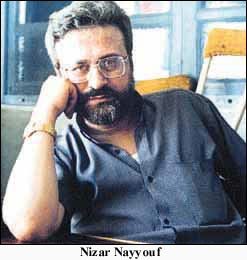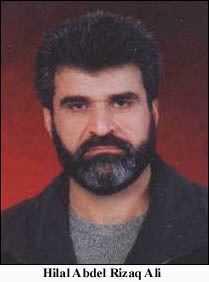 |
| Vol. 3 No. 6 | Table of Contents MEIB Main Page | June 2001 |
 |
Earlier this month, prominent Syrian journalist and human rights activist Nizar Nayyouf announced that he would hold a press conference to reveal detailed information about crimes committed by Syrian intelligence. However, Nayyouf, a founding member of the Committee for the Defense of Democratic Freedom and Human Rights (CDF) who was released on May 6 after nine years in prison for "disseminating false information," never made it to the press conference.
On June 20, the day before the press conference, Nayyouf was abducted by Syrian intelligence officers while traveling to a clinic in Damascus to receive treatment for medical problems stemming from torture and ill-treatment during his years in prison. "They tried to use enticement and threats against me," he later recalled in an interview with Qatar's Al-Jazira satellite television channel. "At first, they tried to tempt me with unbelievable financial offers in return for keeping silent on all that I know. When they failed, they resorted to threats," he said, quoting his captors as telling him "we will cut your tongue off and feed it to the dogs" if he did not cease his provocative statements to the international press.1
Nayyouf was fortunate, for he is well-known abroad, having won the UNESCO international press freedom prize and other awards during his years in captivity. His abduction sparked a stream of protests from the International Press Institute, the Paris-based World Association of Newspapers, and other international human rights groups. On the day after his arrest, the Syrian Arab News Agency quoted an unidentified government official as saying that Nayyouf had faked the abduction in order "to remain in the center of attention and under the spotlight." Nevertheless, fearing that the negative publicity would continue to escalate, Syrian security officials ordered him released on June 22. Afterwards, Nayyouf promptly revealed details of the incident in telephone interviews from his home in Latakia.
 |
Another case which is gaining more and more attention is the abduction of Hilal Abdel Rizaq Ali , 44, shortly after Assad's election in July. Ali, British citizen born in Iraq, moved to Syria to work as a basketball instructor for a local sports club last year. On July 23, he phoned a friend in London and expressed fear of being arrested due to the political activities of a Syrian relative of his wife who was wanted by the authorities for committing a "breach of national security," adding that several other relatives of his wife had been taken into custody by security forces. Two days later, Ali was arrested in the northern city of Hama as he was leaving work with his kids. According to Amnesty International, he was severely beaten by Syrian intelligence agents and, in October, transferred to the Far' Filastin military detention center in Damascus. According to his London-based attorneys, Ali "has never been charged with anything, nor was there any legal warrant for his arrest . . . Furthermore, Mr. Ali was not allowed to consult a lawyer and his family is unaware of his fate."
The British embassy in Damascus contacted the Syrian Foreign Ministry, which initially confirmed his arrest. Subsequently, however, Syrian officials denied that he was taken into custody. In fact, the Syrian government now maintains that Ali never even entered the country, leading his family to fear the worst. "We know nothing about him. Nobody has been able to tell us anything and we have heard reports that he is being tortured," said his brother, Saad Ali, last month. "His wife and children and are going through hell - they are very scared. We have not heard from him for so long we think he may have died."2
According to Amnesty International, "hundreds of long-term political prisoners" affiliated with such groups as the Muslim Brotherhood, the Arab Communist Party (ACP) and the Democratic Baath Party (DBP), remained imprisoned in Syrian detention centers. At least one political detainee has died in custody since Assad assumed power last year and torture of political detainees continues to be "systematically applied."3
Whether Assad himself has approved the continuing human rights abuses perpetrated by the security forces is unclear. Most human rights activists speculate that the abuses have taken place without the Syrian president's authorization. Nayyouf, in fact, said that Assad probably didn't authorize his abduction earlier this month and that he was released only because of the Syrian president's "personal intervention" after several international human rights groups raised the issue.4
Western governments have avoided publicly criticizing Assad, believing that this will weaken his power vis à vis the security apparatus he inherited from his father. Ironically, this hands off policy has permitted the security establishment to freely crack down on dissent without fear of damaging Syrian ties with the United States and Europe.
Notes
1 Al-Jazira TV (Doha), 22 June 2001.
2 The Observer (London), 27 May 2001.
3 Amnesty International, Report 2001: Syria.
4 Associated Press, 23 June 2001.
Related Articles
Dark Days Ahead for Syria's Liberal Reformers, Middle East Intelligence Bulletin, February 2001.